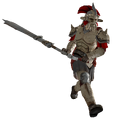My Legion obeys me, even unto death. Why? Because they live to serve the greater good, and they know of no alternatives.
”— Caesar, Fallout: New VegasCaesar's Legion is an imperialistic dictatorship over the American Southwest founded in 2247 by Edward Sallow and Joshua Graham, inspired and partially based on the ancient Roman Empire. The Legion is an ultra-reactionary, utilitarian slave army supported by several tributary populations. The legionaries use trappings of Roman culture, but these are not imposed on the Legion's civilian subjects.[1]
Its legionaries are predominately reconditioned tribals, slave soldiers forming a well-organized, culturally insular fighting force that, as of 2281, mainly operates east of the Colorado River and the Grand Canyon, in the former states of Arizona and New Mexico with small portions of Utah and Colorado. Caesar's ultimate goal is to conquer the New California Republic and merge its civilian culture and infrastructure with the military strength of the Legion, creating a new totalitarian empire.[2]
History[]
Origins[]
The history of the Legion is inextricably linked to its founder and leader, Caesar. Born in 2226 near the Boneyard as Edward Sallow, he was once a citizen of the New California Republic. Following the death of his father at the hands of raiders in 2228, his mother sought the protection of the Followers of the Apocalypse. While she worked for the Followers, cooking and cleaning in their library, the young Edward learned how to read and started taking courses, provided by the organization free of charge.[3] Taught to "bring the torch of knowledge to the wastes", Sallow was a student of uneven quality. Though he was highly intelligent, his success in scientific pursuits was only proportional to his interest in the given subject nor was he particularly popular among his peers, due to his bad temper. For Sallow, the Followers were never an inspiring example, their devotion to scholarship too stifling, and their mission of enlightenment too naive.[4][5]
In 2246, the twenty year old Sallow was an anthropologist and linguist. To benefit from his talents, the Followers sent him east towards the Grand Canyon, on his first expedition. Accompanied by a physician named Bill Calhoun, he was tasked with learning the dialects of the tribes inhabiting the region.[6] On the way to the Canyon, he and his companion happened upon a cache of historical books, including The History of the Decline and Fall of the Roman Empire and the Commentarii by Gaius Julius Caesar. Sallow studied the books rigorously for two weeks, not yet aware of their coming significance.[5] Prior to their arrival in the Grand Canyon, they met with a Mormon missionary, Joshua Graham. Already an accomplished scholar of dialects, Graham was supposed to teach Sallow about the local languages, but before that could happen, the Blackfoot tribe captured the three scholars for ransom.[7]
The tribe was a sorry sight for the future Caesar, weak and insignificant.[7] Worse for the hostages, they were at war with seven other tribes, outnumbered and bound to lose. Unwilling to sink with them, Sallow decided to take certain steps. Objections from Calhoun went unheard.[8] Sallow taught the tribe how to properly maintain their firearms, properly shoot targets, and reload ammunition, after which he began teaching them how to make explosives and drilling in small unit tactics, all of which was based on old books Caesar had read as a Follower of the Apocalypse.[8] Once they were ready, Sallow led them against the Ridgers, their weakest enemy. When the tribe refused to surrender, he ordered every man, woman, and child killed. No exceptions were made. The Blackfoot moved on under Caesar's lead, surrounding the Kaibabs tribe. Upon their refusal to surrender, Sallow took their envoy to the ruins of the Ridgers' village. The piles of corpses were a shocking sight to a tribesman who only knew tribal strife, with the occasional raid, raping, and pillaging, but what Sallow had led was total warfare.[9]
The Legion is Born[]
The Kaibabs surrendered. Then the Fredonians. Then all the remaining Grand Canyon tribes. Caesar was acutely aware that the root cause of all the problems were tribal identities, leading to internecine conflict and preventing any substantial recovery. He knew what had to be done. He had to erase all traces of tribal identities, and substitute a single, monolithic culture in their place. The tribes Caesar fought against and assimilated were primitive even by the standards of the post-nuclear world, with nothing even remotely comparable to what existed out west: No towns, no roads, no meaningful industry. They fell to the superior forces marshaled by Sallow and Graham.[1]
In 2247,[10] when his confederation was large enough, Sallow crowned himself as Caesar, leader of the Great Tribe: the Legion.[11] He deliberately patterned it after imperial Rome. One of the reasons was that this ancient European culture was completely foreign, alien to the ignorant tribals he was subjugating. Second, he considered Rome's highly militarized autocracy adept at integrating conquered cultures the perfect template for a society that could adapt to the challenges of the post-apocalyptic world and thrive, establishing prosperity and peace: a new Pax Romana.[12] The Legion would be a nationalist, imperialist, totalitarian, completely homogenous culture that would focus on long-term stability at all costs.[13]
He soon began putting his words into practice. Calhoun was sent back west to warn that Caesar should not be interfered with, while Graham stayed with Caesar, becoming the Legion's first legate.[11] In the decades that followed, the Legion conquered minor holdings in Utah and Colorado, while the entirety of Arizona and a sizeable portion of New Mexico were brought under its control. Tribes were forcibly assimilated into the Legion, while cities and their inhabitants lived on as subjects of the Legion.[14] Since 2250, Caesar styled himself as the Son of Mars, divinely ordained to subjugate the world to his will.[10][2]
The War with the NCR[]
Conflict with the Republic was inevitable. For Caesar, this isn't just petty ambition. He likens himself to Caesar returning from his conquest of Gaul and the NCR as the corrupt Roman Senate. It's a textbook example of Haegelian dialectics, where the thesis and antithesis conflict, creating a synthesis when the conflict is resolved.[15] When the Legion conquers the NCR, it will be transformed from a republic plagued by bureaucracy, corruption, and internecine political strife into a highly efficient military dictatorship, while the Legion will become a standing army protecting all the citizens of the new empire and the absolute power of its dictator.[16][17]
Obviously, the New California Republic was not willing to roll over and surrender. Following a series of skirmishes and smaller battles, most notably the destruction of Fort Aradesh, the Legion forced a confrontation. In 2277, the Legion faced the NCR at Hoover Dam, in what became known as the First Battle of Hoover Dam. Discovered by Ulysses, a frumentarius, the Dam was a symbolic Rubicon. Caesar's 68[18] reformed tribes attacked the Dam under the lead of Joshua Graham, following a series of deep raids on NCR territory by small groups of skirmishers and sabotage actions by the Frumentarii. However, Graham's elite troops were drawn into a trap laid by Chief Hanlon of the New California Republic Rangers. As General Lee Oliver's soldiers held the line, Rangers and Army sharpshooters targeted their commanders, sowing chaos in Legion ranks. When the Legate ordered his elite forces to punch through and pursue Rangers decimating his officers and sowing chaos in the ranks, the Rangers and 1st Recon sharpshooters retreated into Boulder City. Elements of the Army and Rangers kept the Legion engaged long enough to allow the most experienced legionaries to enter the city. When they did, the Republic's forces pulled out of the city. Once most of them were safe (soldiers and Rangers trapped behind Legion lines had to be abandoned, they triggered explosives packed into the buildings in advance. Chief Hanlon's plan went off without a hitch: The exploding buildings acted as giant fragmentation bombs, killing and maiming most of the legionaries and leaving the rest in a state of shock. The Army and Rangers followed the detonation with a counter-attack, destroying the Legion on the western side of the Colorado and forcing the Malpais Legate to retreat from the Dam. Flanking attacks at Camp Golf and other camps in the Mojave were similarly repulsed.[19] The Malpais Legate returned to Caesar in shame. To demonstrate that failure is not tolerated, even at the highest of ranks, Caesar ordered Graham to be burned alive. The former Legate was covered in pitch, lit on fire, and thrown into the Grand Canyon. This was the worst defeat in Legion's history.[20]
Graham was replaced by Legate Lanius, who embarked on a campaign of expansion eastward to subjugate further tribes for the Legion and gather forces for another confrontation with the Republic.[21] Over the next four years, Caesar rebuilt his army, creating the finest possible blade with which to cleave through the Republic. The Legion's return to and rise beyond its former glory was accompanied by a noticeable decline in Caesar's health. Once healthy, his face became sunken and sickly, his nature more reclusive. But the worst were the headaches, increasing in strength and frequency, affecting his ability to lead. Caesar denied these problems, lashing out at any queries.[22][23] Although they remained silent, the decline was visible to his officers, leading some to question their leader.[24]
By 2281, Caesar returned to Fortification Hill, poised to take the Dam with what remained of the 87 reformed tribes that his Legion had conquered, 14 tribes to be exact, and claim New Vegas as his Rome. Caesar is playing his cards more cautiously this time, and will not give the order for Lanius to attack the Dam until he can unearth the contents of the vault sealed beneath his base in the Mojave. Caesar also needs to neutralize the ruler of New Vegas, Robert House, assassinate NCR President Kimball, attempt to forge an alliance with the Boomers, Great Khans, and White Glove Society, destroy the Brotherhood of Steel, and, perhaps most importantly, deal with his brain tumor.
Society[]
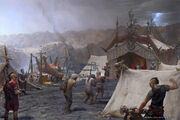
A Caesar's Legion camp
The Legion proper is first and foremost a slave army, the sole owner of which is Caesar. As Caesar conquers the peoples of the wasteland, he strips them of their tribal identities and merges them into his forces. There is no other tribe than the Legion itself. Notably, the non-tribal people who live in Legion-controlled territory are not considered Legionaries. They are essentially subjects, living in the cities and towns under its control, and are generally left free to do whatever they wish, as long as they do not interfere with Legion operations or endanger its position.[14] It seems the Legion does have a limited civil government, however, as evidenced by the Officio ab Famulatus (Office of Servitude) headed by M. Licinius Crassus, which is responsible for overseeing the ownership of slaves. Notably, the title of consul is not a military rank and is not known to be used anywhere else in the Legion.[25]
The brutality of the Legion is a major problem for many, but it also brings benefits. Arizona was once a lawless wasteland where crossing two miles without a clash with raiders was a major feat. The Legion brought peace and quiet to the entire state by exterminating and enslaving the raider tribes.[26]
Ideology[]
The ultimate insult is to be spared.
”— Legionaries to yielding foes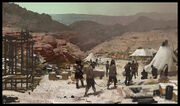
The focus of the Legion's ideology is survival and long term stability at all costs. Caesar disregards democracies as ineffective, fostering corruption and disintegration. Ancient Rome was a militarized autocracy that effectively assimilated the cultures it conquered which he saw as the perfect template for a society that would survive and thrive in face of the challenges of the post-nuclear world. By dedicating its members to a higher ideal, he seeks to prevent humanity from fracturing and destroying itself again.[12] He believes that the only way to achieve this is through enforcing a nationalist, imperialist, totalitarian, homogeneous culture that obliterates the identity of every group it conquers. The individual has no value beyond his utility to the state, whether as an instrument of war, or production.[13]
A natural consequence of this is the emphasis placed on personal sacrifice. Victory cannot be achieved without sacrificing blood and life. To this end, the Legion shuns robots, as they firmly believe that mankind requires warriors and their sacrifice, rather than gadgets that allow for bloodless victories.[27] Naturally, the Legion forbids painkillers and other chems as detrimental to the human condition and Caesar's long-term plans to reshape humanity. Ignorance of medical science among the legionaries also ensures that only the hardiest will survive and go on to become deadly veterans.[28]
Politically, this philosophy is expressed in a general disdain for democracy as a weak and ineffective system that fosters disunity, greed, and self-interest at the expense of the collective and the greater good. Caesar cites the NCR as an example, focusing on government corruption by wealthy brahmin barons and landowners, greed permeating every level of society, all leading to the abandonment of the collective and the greater good. The Legion is intended to be the Republic's opposite, shunning democracy in favor of a strong, centralized rule that would prevent fragmentation and internal weakness. The conquest of NCR will establish a new order, akin to the Roman Empire, complete with the transformation of the Legion from a marauding army into a domestic military force.[29][30][31][32]
This opposition is based on Hegelian Dialectics, where the thesis (NCR) and the antithesis (Caesar's Legion) will inevitably form a synthesis at the resolution of the conflict, eliminating flaws and leaving a new quality, with common elements and ideas. He likens the situation between the NCR and the Legion to the transformation of the ancient Roman Republic into the Roman Empire.[15][16]
Social structure[]
The Legion employs a very strict hierarchy and clear division of roles between the sexes. Legionaries are the main fighting force of the Legion, composed of able bodied men enslaved by the Legion or born into it. They have only one purpose: to fight for Caesar until they fall in battle. This principle is imprinted into each legionary during his reconditioning or upbringing (for those born into slavery), creating fanatically loyal soldiers. Unlike the Roman Empire, experience and veterancy has no bearing on a legionary's position. While they receive better equipment as they advance, this is solely for the purpose of accomplishing more dangerous and complex tasks, with much smaller tolerance for failure. They have no personal freedoms or rights.[33] Their only real choice is where and when they die for Caesar, to whom they are disposable tools, discarded the moment they stop fulfilling their purpose.[34][35]
Women are expressly forbidden from fighting and act as support corps.They are caretakers, healers, midwives and breeders, fulfilling roles essential to maintaining the Legion's continuous campaign of expansion.[36] Of particular note are the priestesses, who raise children taken from their parents, and raise them in keeping with Caesar's doctrine.[37]
While some members of the Legion express condescending or downright misogynistic opinions of women and their non-combat roles, the inherently sexist segregation of genders in the Legion is not based on prejudice, but the principle of minimax. Caesar strictly divides the duties between the sexes in order to fully utilize their potential and optimize the Legion's might. As harsh as it sounds, by forbidding women from combat he increases their output of children (necessary due to the high infant mortality resulting from low level of medical care),[38] giving him a greater number of slave warriors to use in his military campaigns. Caesar himself is not particularly prejudiced against any sex, or rather, treats them both instrumentally, like pawns on a chessboard.[34][35]
In order to maximize breeding and eliminate factors that might lower it, Caesar has decreed homosexuality a capital offence[39] and mandated child quotas from all legionaries.[40]
Subjects[]
Non-enslaved people living under the Legion are primarily inhabitants of non-tribal communities that existed before the rise of the Legion and have been left free, as subjects (for a lack of a better term). Instead of enslaving skilled people and cutting into their power base, the Legion opts to enslave tribes (especially in areas dominated by them, like Arizona, New Mexico, and elsewhere). In certain cases, for example, in active war zones like the Mojave or NCR-controlled territories, the Legion will make an exception and enslave non-tribal persons.[14]
However, those who escape this fate and become subjects enjoy superior stability and security, thanks to the Legion's governance. People who live in Legion towns enjoy a stable, consistent flow of electricity and water, a steady and ample food supply, and very low crime and corruption levels. They enjoy safe and productive lives with one caveat: never disobey or disturb the Legion. Caesar's men only ask once and the order has to be carried out without question, even if it means resettling fifty miles away at a moment's notice. This generally means that Legion subjects have little, if any, political freedom, rights, or say in what happens to their communities.[14] However, if one keeps quiet, goes about their business and fulfills the rare request the Legion has, then Caesar is a peaceful and caring lord.[14][41] Despite generally leaving its subjects to themselves, the Legion does seem to have a limited civil government, as evidenced by the Officio ab Famulatus (Office of Servitude), which is responsible for overseeing the ownership of slaves.[25] Many people don't consider Legion rule to be a problem, as even before Caesar's rise, they had little say in the chaotic wastes.[14]
Legion territories are also very profitable for traders. As long as the trader doesn't try to sell drugs or alcohol to Legionaries (although it's not clear if they can be sold to subjects), they will enjoy a safe territory and very light tax regimen. Traders can actually travel on their own without guards in Legion lands, as all bandits were either ruthlessly exterminated or chased off. Coupled with the absence of heavy NCR taxation out in the frontier, many traders stick to Legion lands for regular trading, though some cross the river to trade with the NCR from time to time, and the Legion apparently does not try preventing them from doing so.[42]
Slaves and outsiders[]
Anyone outside the Legion ranks or under their rule is considered to be "Dissolute" (lacking in morals), while those that are both outside of it and hostile (usually the NCR and its subjects) are called "Profligates" (slightly more dissolute). Freshly caught humans are called "Captures" and are considered the lowest of the low. Their only right is to be tested as a slave. If they do not meet the requirements, they are killed.[43]
Slaves are one step above Captures and consist of captured humans unfit for combat duty as a Legionary. They are expected to adhere to the virtues of a slave (honestas, industria, prudentia - honesty, industry, and prudence) and follow their master's orders without questions.[44] They are given a new name and wear rags with a light red X painted over the chest. During the capture stage, slaves seem to be forced to wear slave collars.[45] Later, when they have been "broken in" and transported deeper into Legion territory, the collars are removed.
Language[]
The vocabulary of Legionaries seems to be a mixture of Latin and English. Most members of the Legion pronounce Caesar's name /ˈkaisar/. Regular wastelanders, members of NCR, as well as older Legion members, generally use the Anglicized pronunciation /ˈsiːzər/. Legion members are fastidious about classical Latin pronunciations, such as pronouncing the traditional Roman greeting "ave" (hail) [ˈaweː], although at least some Legion subjects seem to use the Anglicized pronunciations.[46] Legion members are called "legionaries" (not legionnaires, which is a modern phrase and applied to the Légion étrangère). Those who are liked by the Legion are called "amicus", Latin for comrade/friend.
Currency[]
Caesar's Legion uses two types of coinage, the denarius and aureus, as their main form of currency. They are presumably named after the Roman coins of the same names. They are minted by the Legion from scavenged[47] silver and gold, with each coin bearing the profile of Caesar. Despite Caesar's poor relations with the other factions in New Vegas, Legion currency is still accepted as payment in the Mojave Wasteland, even from NCR merchants, owing to the precious metals the denarius and aureus are minted from. The exchange rate is 4 bottle caps to 1 denarius, and 100 bottle caps to 1 aureus.
The denarius (silver), which bears an image of a younger Caesar on the obverse and Caesar, Joshua Graham and Bill Calhoun on the reverse. The inscriptions are in Latin, "Caesar Dictator" meaning "Dictator Caesar" or "Absolute Ruler Caesar" on the front and "Magnum Chasma" meaning "Great Abyss" or "Great Fissure" on the back, referring to the Grand Canyon. The symbolism is simple - the denarius commemorates young Caesar's journey to the Canyon and his first victories as a dictator of the Grand Canyon tribes.
The aureus (gold), which bears the portrait of the older Caesar on one side and the symbol of the 10th Legion (the bull) on the other. The inscriptions are in Latin, "Aeternit Imperi" meaning "For the eternity of the empire" on the front and "Pax Per Bellum" meaning "Peace through War" on the back.
Religion[]
The Legion enforces the Cult of Mars, a cult of personality focused on worshiping Caesar as the Son of Mars, as the state religion. It began in 2250 when Caesar declared himself the Son of Mars, ordered by Mars to conquer all of Earth. To facilitate this conquest, Mars cleansed the Earth with fire, bringing humans to their lowest ebb. Caesar's divine duty is to deliver the wasteland from chaos and barbarism. Caesar's divine status allows him, in the minds of the Legion, to demand servitude from everyone. The general rule is that obeying and following him is to follow the will of Mars. By extension, disobedience is synonymous with condemning oneself to death.[37][48]
The religion is strictly enforced. To prevent dissent, children of slaves are removed from their families and indoctrinated by priestesses of Mars. The appearance of divinity is maintained through enforced ignorance. Legionaries are taught to believe (or made to) that all of the customs enforced by Caesar were dictated to him by Mars himself.[37] While to most this comes with no problems, the education of the average wastelander being what it is, Caesar truly fears the educated men, most importantly the Followers of the Apocalypse. To prevent his grand plagiarism from being discovered, the standing order is to kill Followers on sight or deliver them (and any other learned captures) to Legion interrogators. Those that make the mistake of speaking out about this end up as severed heads on spikes.[17]
In addition to Caesar, Mars also appears to be worshiped by Legionaries[48], although there is no mention of the other Roman gods.
Military[]
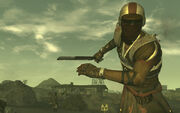
A veteran legionary
Caesar has patterned his slave army after the pre-Marian Roman Imperial Legions. What follows is a breakdown of the organization of the Legion.[37]
- Caesar's Legion: The entire army, led by Caesar (political leader) and his Legate (military commander).
- The Legion is divided into Cohorts of 480 men, which are divided into:
- 8 Centuriae of 60 men,[49] each led by a centurion, which divide into:
- 10 Contubernia, each led by a decanus. The Contubernium is the squad-level unit of organization and the usual size of a task force tasked with skirmishes or harassing larger groups of opponents.
A notable feature of the Legion is that the rank is determined by experience and merit in combat. The least seasoned legionaries (equivalent to pre-Marian Hastati or post-Marian auxiliary skirmishers) are typically fielded first during battle, allowing them to prove their mettle in combat. Those who survive and prove themselves on the battlefield become prime legionaries (equivalent to the pre-Marian Principes), eligible for command as a decanus and deployment as second wave attacks.[50]
The top ranks of the legions are occupied by veterans (equivalent to pre-Marian Triarii), who form the third wave and rear guard. These elite troops are deployed once the first two waves fail to achieve their objectives, allowing the Legion to field its most powerful, fresh troops against a weakened, tired enemy.[50] Veterans who prove themselves as leaders may be eligible for centurion status, becoming the deadliest members of the legion and its most skilled commanders.
The Legion has special postings and branches in addition to regular military ranks. The vexillarius (standard-bearer) carries the Legion's vexillium into battle and serves as a rally point for other legionaries. The frumentarii and speculatores are the Legion's special forces, tasked with infiltration, subterfuge, recon, and other essential tasks, both of which have special training that legionaries who show promise in such matter can participate in.[51] Finally, the Praetorians are an elite unit of bodyguard hand-picked by Caesar to protect him and the Legate from loss of life.
Legionaries[]
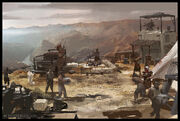
The Legion invests plenty of time and effort into hardening their soldiers into the most powerful combatants the wasteland has ever seen. The Legion draws its manpower from the 87 conquered tribes and any male children given birth too in the Legion.[52] The physical conditioning regimen is brutal and extremely demanding, on par with the NCR Rangers. Legionaries are uniformly fast, strong, and extremely dangerous. They can run half again as fast as the best of NCR troops and are capable of closing distances with frightening speed.[53] Developing a resistance to pain is also an integral part of the training, usually carried out via brutal hand-to-hand combat and melee weapons exercises.[54]
Even more impressive than their physical traits is their discipline. Rank and file legionaries are trained to not have to think for themselves, to have conflict removed from their minds.[55] The resulting discipline in the field is beyond the ken of their closest competitor, the NCR,[36] as the legionaries will perform any order given by their superiors and won't back down until they are dead or recalled by their commanders.[56] If training fails, fear will motivate Legionaries to succeed. Legionaries who fail or disobey orders end up crucified or torn apart in front of Caesar. In extreme cases, the Legate may order decimation, where a tenth of the unit's troops are beaten to death by the other nine-tenths, as an extreme disciplinary action.[57]
These traits make them ferocious close quarters combatants, where they have few equals. NCR soldiers are generally advised to take down legionaries at range, before they can engage them in close combat. Of course, while the standard kit is light armor and a melee weapon, the Legion is a pragmatic fighting force. Legionaries also receive training in ranged combat and firearms are not uncommon, though most are in poor condition. Legionaries are authorized to and will scavenge better weapons from fallen enemies and use them in combat. As such, the NCR orders troops to destroy their weapons (eg. by throwing them over the edge of Hoover Dam) if fatally wounded, to avoid bolstering the firepower of the legionaries.[58] Higher ranking legionaries, like veterans and centurions, are commonly provided with high quality, well maintained firearms, like the anti-materiel rifle or 12.7mm submachine gun, which they can use with frightening efficiency.[59]
The end result is a well rounded military force that is capable of fighting on all distances, using all types of weapons, and is particularly adept at taking enemy fortifications and bases. Of course, the Legion has weak sides. The extreme discipline and obedience of the lower ranks require a strong chain of command to exist, to guide the soldiers on the field of battle. Without decanii and centurions, the legionaries will become a disorganized mass, easy to rout and destroy. This reliance on veterans has been exploited to great effect by Chief Hanlon during the First Battle of Hoover Dam.[60] By eliminating officers, the Legion's forces were easily drawn into a trap at Boulder City and destroyed.[61]
Military doctrine[]
The Legion employs an organized method of warfare. In larger battles, legionaries are deployed in waves, with recruits up front, prime soldiers behind them and veterans, the old guard, bringing up the rear. The enemy wears himself out dealing with the first two waves, with the veterans mopping up any remaining resistance when their turn comes. This is not an omnipresent, cardinal rule, however: Caesar can adapt and run any mix of legionaries as skirmishes, whilst retaining order in the ranks.[50]
Smaller Legion raids typically involve suddenly attacking, killing everyone (sometimes taking slaves) and leaving quickly. As Legate Lanius states, their forces are much better suited at taking positions than holding them due to their up close style of fighting.[62] Furthermore, Legionaries will deliberately commit atrocities to terrorize their enemies and break their morale.[37] On occasion, they are known to use children as traps and soldiers,[63] and rape to terrorize civilian populations.[64] The Legion also seeks to demoralize opposing armies before the battle even begins by torturing prisoners in sight of the army's position.[65]
Foreign relations[]
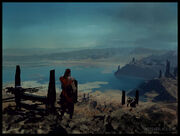
As a single-minded, monolithic empire, the Legion's aim is to dominate the known world and unite it under its banner. In 2281, it is locked in conflict with the New California Republic at the Colorado River. Tribes that weren't pressed into it are also openly hostile to the Legion, fearing that they too will become victims of its campaign of conquest, as even with guarantees of safety and independence, Caesar has gone against his word and assimilated tribes he previously promised he'd leave alone. This causes even ruthless organizations like the Van Graffs to oppose the Legion in addition to organizations like the Desert Rangers. However while many "civilized" groups dislike the Legion's ways, they have great success in assimilating "tribal" groups. Tribals and their general respect for power over anything else typically side with the Legion over the NCR. Ex-tribals the Omertas and White Glove Society can ally with the Legion. The Great Khans and White Legs are also firm allies of the Legion.
Dale Barton often prefers to trade in Legion territories, saying that he finds it cheaper as he rarely has to hire protection or pay extortionate taxes, due to the effectiveness of Legion suppression of raiders and wasteland creatures.[42] Even Rose of Sharon Cassidy has admitted to admiring Legion-controlled areas, as they attract traders, merchants, and wastelander communities in general to their high level of safety, especially when compared to NCR territories and uncontrolled regions.[66]
According to Ulysses, Caesar has commanded Legion couriers not to kill another courier (even if they appear to not be Legion), because many couriers in fact were Frumentarii.[67]
Technology[]
Overall, it is incorrect to treat the Legion's technology as primitive. Combat gear is built with focus on reliability and ease of manufacture, standardized across the Legion. Furthermore, the Legion is easily capable of erecting large fortifications (e.g. the Fortification Hill encampment), establish supply chains for the massive army, and, as mentioned above, mass produce standardized weapons and armor for its footmen. Caesar firmly believes that reliance on technology weakens humans, and was partially responsible for the Great War. The Legion espouses martial prowess and individual fitness to reduce the need for technologically advanced weapons. The technological refinement of an individual legionary's gear is directly tied to his status. Lower ranks typically use either simple firearms (typically revolvers or lever-action rifles), power fists, or melee weapons in the form of machetes and throwing spears, crafted from scavenged materials that mimic the ancient Roman short sword (gladius) and javelin (pilum). Higher ranks, such as prime legionaries, decanii, and centurions have access to superior weapons, such as anti-materiel rifles, Marksman carbines, and super sledges. The personal guards of Caesar themselves are equipped with high tech ballistic fists to complement their martial prowess.[68]
While no Legion member wields energy weapons, they show interest in purchasing them from the Van Graffs. The Legion is also never shown using power armor, though pieces of what appears to be T-45 power armor are used in centurion armor. Oddly enough, the Legion has huge amounts of Stealth Boys. These Stealth Boys are never seen used by legion soldiers in the Mojave, but are used by the Legion at Dry Wells and the Legion marked men at the Divide. A high reputation with the Legion will lead to a steady cache of Stealth Boys for the Courier.[69]
All troops wear standardized Legion armor, mimicking the Roman lorica hamata or lorica segmentata, created from pre-War sports gear (mostly if not exclusively football gear) armored with metal plates, including the helmet. The gear is worn over a tunic. Centurions make their own armor, crafted from elements of body armor scavenged from felled foes.[70]
The only absolute opposition to technology is in robotics. Caesar dislikes the thought of having robots win a war fought by men, as it defeats the need for sacrifice for the greater good.[27] Beyond that, the Legion is opportunistic and will use any kind of technology to further its goals, whether it be using a howitzer to suppress 1st Recon and veteran Ranger snipers or occupying Helios One after the Courier wipes the NCR out with Archimedes I. Radios are frequently used,[71] but overall the Legion opts for devices that use no power to increase reliability. The Legion does not need or truly desire power sources like the NCR, but at no point oppose its usage as they do with chems, alcohol and combat robots.
Interactions[]
- Siding with the Legion can make keeping companions very difficult while following the main questline, and most human companions will likely abandon the player over time. Veronica Santangelo will likely leave when the Brotherhood bunker is destroyed, Craig Boone will leave when the player kills several NCR soldiers, and Arcade Gannon will leave when your reputation with the Legion grows too high. Rose of Sharon Cassidy allows the player to work with the Legion despite her dislike for them, Raul Tejada is somewhat supportive due to their ability to provide security,[72] and Lily Bowen is too mentally damaged to have any opinion whatsoever. It is possible to maintain all companions through a mix of not speaking to Gannon, not traveling with Boone while killing NCR soldiers, and luck in Veronica's case.
- Although initially neutral towards the player character, Legion patrols in the Mojave Wasteland are openly hostile towards most travelers, including prospectors and traveling merchants, and will attack them on sight.
- Cannibalism is not frowned upon and even practiced by some high ranking officers, like Aurelius of Phoenix. There is little discussion of this policy, but it seems to be well known as members of the White Glove Society are aware of it.[73][74][75]
- A female courier will not be allowed to fight in the arena, regardless of reputation or progress in the game. An exception is made, however, should the female courier choose to fight Benny to the death during Render Unto Caesar.
- While several non-player characters, such as Cass and Major Knight allude to homosexuality being accepted (if not the norm) in the Legion, Jimmy claims from first hand experience that homosexuality is punishable with death. It's unclear which claim is correct or how they reconcile. The best possible theory is that homosexuality isn't tolerated, but most outsiders use the concept to slander them (i.e. cracking wise about their togas being "skirts").
- Many believe that without Caesar, the Legion will fall to in-fighting without someone with the charisma and leadership qualities like Caesar,[76] chief among them being Joshua Graham.
Development[]
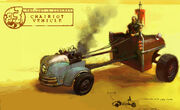
A chariot with vexilla in Van Buren
The Caesar's Legion concept was created by Chris Avellone during pre-production for Black Isle's canceled Fallout 3. Joshua Sawyer then elaborated on the concept:
One of the few big things I did on Van Buren was taking an organization Chris invented and changing it (perhaps mangling it in the process) into a neo-Roman slavers' legion with all the weird titles, makeshift costumes, and traditions of that group.
”According to Chris Avellone's test pen-and-paper campaign, the first fringe unit of Caesar’s Legion was planned to appear as a hostile enemy in the Circle Junction Train Yards. Furthermore, the Daughters of Hecate and Caesar’s Legion was thought as the female and male polar opposites, which was supposed to allow the player, depending on gender, to rule either one and use them to build an army, Postman style.[77]
Sharptooth, a member of Hangdog tribe, was planned to be a spy for Caesar's Legion, reporting to their agents in Denver, only because Caesar holds Sharptooth's sister as a slave. If this became known, the other Hangdogs would demand to banish him and his family to the wasteland. Bares His Teeth would have no qualms about doing this.[78] Before being merged by designers with the Blackfoot tribe, Hangdog's tribe could be planned to live in northeastern Colorado, near Denver.[79]
Behind the scenes[]
The system[]
Breeding issues are pretty huge in cultures that took a big step back from infant mortality progress made in the last 100-200 years. Prior to the last few centuries, infant mortality was often around 50%-ish. Child mortality (prior to age 12) was about 60%. Those are pretty awful odds of reaching adulthood.
Remember that Caesar's Legion is basically a roving army that continually breaks down and absorbs tribes that it conquers. That can only go on for so long, and Legionaries who are indoctrinated from birth are even more loyal than adolescents who are integrated. Breeding new generations of Legionaries is vital for the Legion's continued existence.
Even though breeding is incredibly important in the Legion, there isn't any concept of family outside of the Legion's structure. All of the places where the player encounters the Legion are forward camps where direct military service is given the most weight and is of the most immediate importance. Because only males are involved in that service, they look down upon females even though it's incredibly short-sighted.
”— J.E. SawyerCaesar takes whatever pieces of history he finds useful and disregards things he doesn't find useful. He has specific goals and uses history as a tool to meet those goals. When history doesn't help him, he doesn't use it. Even things like a reluctance to use advanced technology have more to do with his desire to keep the Legion ignorant/dependent on him than with anything "historical". Control is very important to him, even if it means that the people who serve him lack any of the medical knowledge necessary to help diagnose or treat his problems. It's very important for Caesar to maintain that the Legion is different. It is physically different, has different values, and different priorities. When Romans were wearing pants, they thought people wearing skirts were barbarians. When Romans wore togas, they thought people wearing pants were barbarians. People on the other side of that river wear pants. Our identity is good, your identity is bad.
Clearly there are many things Caesar does that work against his goals, or choices he made to emphasize one goal over a conflicting goal and it resulted in problems. But it's important to understand that Caesar calls the shots in the Legion. And when Caesar's not around, it's someone following his lead. Whether that's Lanius or Joshua Graham, there's not going to be a fun party when one of these guys rolls into your town. Events in the vein of Tamerlane and Simon de Montfort are going to happen. Events that culminate in pyramids of human heads, mass blindings, and burning a cathedral down with an entire congregation inside.
[...]
Conquered men, women, children, elderly people -- they don't spontaneously rise up and try to kill people who abuse and oppress them. Most people are not heroic. Most people are easily terrified, especially once they have already been placed in subjugated position. And if they are heroic, they usually die heroic deaths, alone. It continues to happen all over the world. Right now, somewhere, someone is being beaten and horribly abused and even if given the opportunity to strike back at the person doing the abuse, they won't take it.
In Roman Britain, the tribes didn't stage a successful coup against the occupying forces even when given ample opportunity and more than enough reason to unite. On three separate occasions, the governor of Britain broke off from the empire. Even in a state of Roman civil war, the tribes were unable to eject the Romans. The one very notable case of rebellion was during Suetonius Paulinus' campaign in what is now Wales. The leader of the Iceni, Boudica, was beaten and her daughters were raped because Boudica challenged the transition of her late husband's authority to the Roman governor (Paulinus). Only with Londinium essentially vacated of military forces did the Iceni and Trinovantes dare to attack. They were successful in causing a huge amount of civilian damage, but in the end, Paulinus' troops rolled over the Iceni and routed them. The nearby Brigantes provided essentially no help to the Iceni and at least one source suggests Boudica may have even been poisoned by the Brigantes' queen. Someone mentioned Nero earlier; it's worth noting that all of this happened under Nero's rule and Rome still easily held Britain despite Nero's general lack of... being good as an emperor.
This pattern can be found a lot in history. It's rare for spontaneous uprisings to happen against conquerors. Or rather, it's more appropriate to say that it is extremely common for abusive occupation to go effectively uncontested for years, decades, or even centuries.
”— J.E. SawyerWhether you think it's a "legit" reason or not, it's actually to ensure that the Legion breeds as many new legionaries as it can at the fastest possible rate. The way it is communicated in game often comes across as "traditionally" sexist instead of "follow these gender roles for army min-maxing".
”I've never thought of Caesar's or the Legion's activities as "edgy". For their own purposes, they engage in a variety of horrible practices that others have engaged in throughout history. I'm sure individual players might want to engage in ranking atrocities -- something I've never really found was productive in discussions about history -- but Caesar and his crew in the same league as other brutal warlords. He was inspired (on our end) by people like Charles Taylor, Timur, and Simon de Montfort (the crusader). "Caesar" is a persona he adopted, but he effectively operates as a warlord with no regard for individual human lives outside of how he can use them.
”Language[]
The pronunciation of Latin in the game is based on classical, not ecclesiastic, rules of pronunciation. While it is difficult for us to know how Latin was actually pronounced in the time of Julius Caesar, classical pronunciation assumes that the presence or absence of certain letter/sound combinations in the surviving languages of Romanized cultures can inform our understanding. The most obvious example is the name "Caesar" itself, one of the earliest Latin loan words to Germanic languages, which became "Kaiser". Another is a word Caesar himself used, "Celtæ". Greek historians used the word "Κελτοί", and there's not a lot of debate over how that's pronounced. Just as Italian doesn't follow Latin pronunciation (and in fact pretty much abandoned case, which is an enormous part of Latin -- thanks Jabby), Old French and Late Latin softened many of the Latin consonants before they entered English. Thus, we have people hissing at each other over the pronunciation of "Celt" and "celtic": Anglicized Latin words passed to us through Old French from the days of the Roman Republic, where they had been borrowed from a Greek word that was likely a self-identifying term for a tribe on the Iberian peninsula. Inappropriately, we almost always use those terms to refer to Irish people and things.
Anyhoo, generally speaking, if you find an academic textbook on Latin pronunciation these days, it's going to follow classical rules. If you're taught Latin through your local church, you may very well learn Italianate/ecclesiastic rules. Caesar learned from academic textbooks, so he passed on that tradition.
”— J.E. SawyerEdward Sallow had a FotA education with all of their information resources at his disposal. All it takes is the first chapter of Wheelock's (or equivalent) and you've got pretty much all the rules for pronouncing classical Latin.
How the Legion pronounces "Caesar" is how Edward Sallow told them to pronounce it. The rest of the F:NV world pronounces "Caesar" the way most people in Pre-War America would have pronounced it.
”Slaves and revolt[]
I think this is a reasonable point to argue, but what Machiavelli wrote about is not directly comparable to what the Legion is. Machiavelli wrote (mostly) about princedoms and republics. The Legion isn't structured at all like a republic -- not like a Renaissance Italian republic nor like the Roman Republic -- and not like a princedom, either. Caesar also takes terrible steps to annihilate sense of tribe and family -- e.g. Legionaries have sex with many captive women, children of those unions are not raised by any Legionary who had sex with the mother, nor by the mother herself. Caesar does everything he can to prevent anyone having a sense of belonging to anything other than the Legion.
I think it's conceivable that even in that environment, non-Legionary slaves could unite to try to overthrow Caesar, but I disagree that it's guaranteed success simply through numbers. In Roman Britain, Suetonius Paulinus (the Roman governor) stripped Boudicca of her right to rule the Iceni, had her beaten and her daughters raped for protesting, then took off to wage war in Wales. While he was gone, she and her tribe sacked Londinium, killed tens of thousands, and were subsequently annihilated by the Roman legions when they returned -- despite the Iceni outnumbering Paulinus' forces significantly. I think it's more likely that Legionaries would internally decide to get rid of Caesar (much like the historical Praetorian Guard did on several occasions), but I think this would require a mindset and perspective that is alien to most Legionaries.
”Gallery[]
Units[]
Historical figures[]
Caesar (co-founder and leader of Caesar's Legion)
Joshua Graham (co-founder of Caesar's Legion, first Legate once known as the "Malpais Legate" and now known as the "Burned Man")
Lanius (second Legate known as the "Monster of the East")
Lucius (Leader of the Praetorian Guard)
Vulpes Inculta (Leader of the Frumentarii)
Ulysses (important Frumentarius, discoverer of Hoover Dam)
Aurelius of Phoenix (important centurion in charge of Cottonwood Cove)
Gaius Magnus (important centurion in charge of Dry Wells, conqueror of the 87th tribe)
Salt-Upon-Wounds (War Chief of the White Legs, destroyer of New Canaan)
Miscellaneous[]
Vault Boy reputation image in color
Appearances[]
Caesar's Legion appears only in Fallout: New Vegas. They were also to appear in Black Isle Studios' canceled Fallout 3, Van Buren as well as Black Isle's never-realized Fallout 4. Caesar's Legion was also to play in a minor role in the canceled Fallout: Brotherhood of Steel 2.
Sources[]
- Denver design document/1
- Denver design document/2
- Denver design document/3
- Denver design document/4
- Denver design document/5
- Ouroboros design document/1
- Ouroboros design document/2
- Blackfoot Tribe design document/2
- Blackfoot Tribe design document/3
- Blackfoot Tribe design document/4
- Blackfoot Tribe design document/5
- Circle Junction design notes
- Hoover Dam design document/1
- Hoover Dam design document/2
- New Canaan design document/1
- Reservation design document/1
- Reservation design document/2
- Reservation design document/5
- Mesa Verde design document/1
- Mesa Verde design document/2
- Twin Mothers tribe PIPBoy entries
- Twin Mothers design document/1
- Twin Mothers design document/2
References[]
|
| |||||||||||||||||||||||||||||||||||||||||||||||||||||||||||||||||||||||||||||||||||||||||||||||||||||||||||||||||||||
| ||||||||||||||||||||||||
| ||||||||||||||||
















